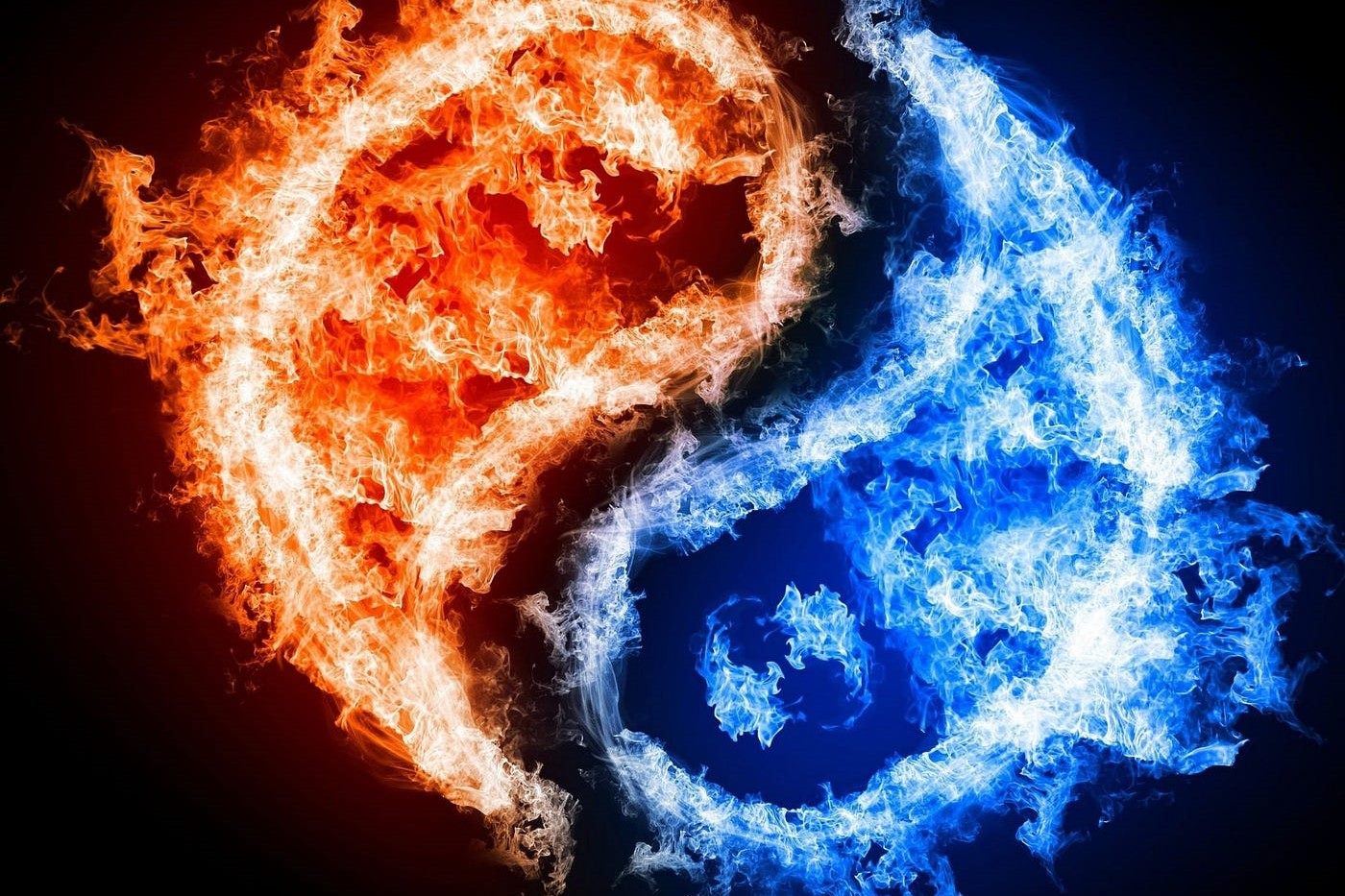Home>Philosophy>The Ultimate Showdown: Dharma Vs. Karma – What You Need To Know!


Philosophy
The Ultimate Showdown: Dharma Vs. Karma – What You Need To Know!
Published: February 23, 2024
Discover the key differences between Dharma and Karma in this ultimate philosophical showdown. Gain a deeper understanding of these concepts and their significance in your life. Explore the essence of philosophy today!
(Many of the links in this article redirect to a specific reviewed product. Your purchase of these products through affiliate links helps to generate commission for Noodls.com, at no extra cost. Learn more)
Table of Contents
Introduction
Welcome to the ultimate philosophical showdown: Dharma vs. Karma! These two concepts, deeply rooted in Eastern philosophy, have captivated the minds of scholars, spiritual seekers, and curious minds for centuries. As we embark on this enlightening journey, we will unravel the profound meanings behind Dharma and Karma, exploring their individual significance and the intricate interplay between them.
Diving into the depths of these philosophical pillars, we will uncover the timeless wisdom they offer, shedding light on their relevance in our modern lives. Whether you're a seasoned philosopher or a newcomer to these concepts, this exploration promises to enrich your understanding and inspire a deeper contemplation of the fundamental principles that shape our existence.
So, fasten your seatbelts and get ready to embark on a thought-provoking expedition into the realms of Dharma and Karma. Let's unravel the mysteries, confront the complexities, and emerge with a profound appreciation for these timeless philosophical concepts. Are you ready? Let's delve into the heart of Dharma and Karma and discover what makes them integral to the human experience!
Understanding Dharma
Dharma, an ancient Sanskrit term with deep philosophical significance, encompasses a multifaceted concept that transcends mere religious or moral implications. At its core, Dharma embodies a profound sense of duty, righteousness, and cosmic order that underpins the fabric of the universe. It serves as a guiding principle, illuminating the path towards harmonious living and ethical conduct.
In Hinduism, Dharma is intricately woven into the tapestry of life, serving as the moral compass that governs individual actions and societal harmony. It encompasses the inherent duty and responsibilities associated with one's position and stage in life, known as "varna" and "ashrama." This intricate framework outlines the ethical obligations and righteous conduct expected from individuals based on their societal roles and life stages.
Furthermore, Dharma extends beyond the realm of personal conduct, permeating the collective consciousness of society. It upholds the principles of justice, fairness, and moral law, fostering a cohesive and equitable social order. The concept of "Rita," closely aligned with Dharma, signifies the cosmic order and universal harmony that governs the natural and moral realms.
In the broader context of Eastern philosophy, Dharma transcends religious boundaries, resonating with universal truths that transcend cultural and spiritual divides. It embodies the interconnectedness of all beings and the inherent moral duty to uphold righteousness and integrity in thought, speech, and action.
Moreover, Dharma encompasses the pursuit of self-realization and spiritual growth, guiding individuals towards a life of virtue, compassion, and inner harmony. It beckons individuals to align their actions with higher principles, leading them on a transformative journey towards self-discovery and enlightenment.
In essence, understanding Dharma entails embracing the intricate tapestry of moral, ethical, and cosmic responsibilities that define our existence. It beckons us to navigate life with integrity, empathy, and a deep reverence for the interconnectedness of all life forms. By embodying the principles of Dharma, individuals embark on a profound quest for self-realization and contribute to the collective flourishing of humanity.
As we unravel the layers of Dharma, we are beckoned to introspect and align our actions with the timeless principles that uphold the sanctity of life and the cosmic order. Let us now venture deeper into the profound realm of Karma, exploring its intricate implications and the profound interplay between these two foundational pillars of Eastern philosophy.
Understanding Karma
Karma, a concept deeply ingrained in Eastern philosophy, embodies the fundamental principle of cause and effect, shaping the trajectory of individual lives and the cosmic order. At its essence, Karma encapsulates the idea that every action, intention, and thought generates a corresponding energy that reverberates through the fabric of existence.
In Hinduism, Buddhism, and Jainism, Karma serves as a pivotal force that governs the cycle of birth, death, and rebirth, known as samsara. The intricate web of Karma intertwines the past, present, and future, dictating the experiences and circumstances individuals encounter in their lifetimes.
The concept of Karma extends beyond mere actions, delving into the realm of intention and consciousness. It emphasizes that the quality of one's thoughts and intentions influences the karmic energy generated, shaping the individual's destiny and influencing their future experiences.
Moreover, Karma operates on the principle of moral causation, elucidating that virtuous actions yield positive karmic outcomes, while unwholesome deeds engender adverse repercussions. This intricate interplay between actions and their karmic consequences underscores the profound responsibility individuals bear for their choices and conduct.
Furthermore, Karma transcends the boundaries of individual existence, permeating the collective consciousness and societal dynamics. It underscores the interconnectedness of all beings, illustrating how the collective karmic energy of a community or nation influences its trajectory and collective destiny.
In the broader context of Eastern philosophy, Karma serves as a potent catalyst for personal growth and spiritual evolution. It beckons individuals to cultivate mindfulness, ethical conduct, and compassion, recognizing the profound impact of their actions on their karmic trajectory and the interconnected web of life.
Embracing the concept of Karma empowers individuals to navigate life with a heightened sense of awareness and accountability, fostering a deep reverence for the intricate interplay between cause and effect. It invites individuals to embark on a transformative journey of self-discovery, aligning their thoughts, words, and deeds with higher principles of righteousness and harmony.
As we unravel the profound implications of Karma, we gain a deeper appreciation for the intricate interplay between actions, intentions, and their karmic reverberations. Let us now delve into the captivating relationship between Dharma and Karma, illuminating the profound synergy that underscores these timeless philosophical pillars.
The Relationship Between Dharma and Karma
The profound relationship between Dharma and Karma encapsulates the intricate interplay between moral duty and the cosmic law of cause and effect. At the heart of this symbiotic relationship lies the fundamental principle that governs the ethical conduct and karmic repercussions of individual actions.
Dharma, with its emphasis on righteous living and ethical responsibilities, serves as the guiding compass that directs individuals towards virtuous conduct and harmonious coexistence. It delineates the moral obligations and societal duties that individuals are called to uphold, fostering a sense of collective well-being and social equilibrium. In essence, Dharma lays the groundwork for ethical living, enjoining individuals to navigate life with integrity, compassion, and a deep reverence for the interconnected web of existence.
On the other hand, Karma operates as the cosmic arbiter of cause and effect, intricately weaving the karmic tapestry that reflects the consequences of individual actions and intentions. The concept of Karma underscores the profound interconnectedness between one's ethical conduct and the ensuing karmic outcomes, elucidating that virtuous deeds yield positive karmic repercussions, while unwholesome actions engender adverse consequences. This intricate web of karmic energy intertwines with the fabric of Dharma, shaping the moral and ethical landscape of individual lives and societal dynamics.
Moreover, the relationship between Dharma and Karma extends beyond the realm of individual existence, permeating the collective consciousness and societal framework. Dharma, as the moral bedrock of societal harmony, underpins the ethical framework that governs the collective conduct of a community or nation. In parallel, the collective karmic energy generated by the thoughts, intentions, and actions of a society influences its trajectory and collective destiny, underscoring the profound impact of collective ethical conduct on the karmic tapestry of a community.
Furthermore, the synergy between Dharma and Karma beckons individuals to navigate life with mindfulness, integrity, and a deep awareness of the karmic repercussions of their choices. It underscores the intrinsic relationship between ethical living and the karmic outcomes that reverberate through the cosmic web of existence, emphasizing the profound responsibility individuals bear for their actions and intentions.
In essence, the relationship between Dharma and Karma embodies a harmonious synergy, illuminating the profound interconnectedness between moral duty and karmic consequences. It beckons individuals to tread the path of righteousness, mindful of the intricate interplay between their ethical conduct and the karmic reverberations that shape their individual destinies and the collective evolution of humanity.
As we unravel the intricate relationship between Dharma and Karma, we gain a deeper appreciation for the profound synergy that underscores these timeless philosophical pillars. Let us now delve into the practical application of Dharma and Karma in daily life, exploring how these foundational concepts enrich and guide our everyday experiences.
Applying Dharma and Karma in Daily Life
Applying the profound principles of Dharma and Karma in our daily lives transcends mere philosophical contemplation, beckoning us to embody these timeless concepts in our thoughts, words, and deeds. As we navigate the complexities of modern existence, integrating the essence of Dharma and Karma enriches our experiences and fosters a deeper sense of purpose and ethical conduct.
Embracing Dharma in daily life entails honoring our inherent duties and responsibilities, aligning our actions with righteousness and ethical conduct. Whether in our personal relationships, professional endeavors, or societal interactions, embodying the principles of Dharma calls us to act with integrity, compassion, and a deep reverence for the interconnectedness of all beings. By upholding the moral compass of Dharma, we contribute to the collective harmony and well-being of society, fostering an environment of mutual respect and ethical coexistence.
Furthermore, integrating the concept of Karma into our daily lives invites us to cultivate mindfulness and accountability in our actions and intentions. Recognizing the profound interplay between cause and effect, we become conscious of the karmic repercussions of our choices, fostering a heightened awareness of the energy we emanate into the world. By infusing our thoughts and deeds with positivity, compassion, and ethical conduct, we sow the seeds of virtuous karma, shaping our individual destinies and contributing to the collective elevation of consciousness.
In our interactions with others, the principles of Dharma and Karma guide us to embody empathy, fairness, and ethical discernment. By approaching conflicts with a sense of equanimity and ethical clarity, we uphold the principles of Dharma, fostering harmonious resolutions and nurturing a culture of mutual respect and understanding. Moreover, by infusing our interactions with kindness and compassion, we generate positive karmic energy, uplifting the collective consciousness and contributing to a more harmonious and interconnected world.
In essence, applying Dharma and Karma in daily life transcends philosophical abstraction, manifesting as a lived experience that shapes our individual growth and societal dynamics. By embracing these timeless principles, we embark on a transformative journey of self-discovery and ethical living, contributing to the collective flourishing of humanity.
As we integrate the essence of Dharma and Karma into our daily experiences, we become catalysts for positive change, nurturing a world guided by principles of righteousness, compassion, and karmic harmony. Let us embark on this profound journey, embodying the principles of Dharma and Karma in our thoughts, words, and actions, and nurturing a world guided by ethical clarity and karmic elevation.
Conclusion
In conclusion, the timeless concepts of Dharma and Karma transcend the boundaries of philosophical discourse, permeating the very essence of human existence. Through our exploration of Dharma, we delved into the profound significance of moral duty, ethical responsibilities, and the cosmic order that underpins the fabric of the universe. It became evident that Dharma serves as a guiding principle, illuminating the path towards harmonious living, ethical conduct, and the pursuit of self-realization. Embracing Dharma beckons individuals to navigate life with integrity, empathy, and a deep reverence for the interconnectedness of all life forms.
Similarly, our journey into the realm of Karma unveiled the intricate web of cause and effect that shapes individual destinies and the cosmic order. We gained a profound appreciation for the far-reaching implications of Karma, recognizing that every action, intention, and thought generates a corresponding energy that reverberates through the fabric of existence. Embracing the concept of Karma empowers individuals to navigate life with a heightened sense of awareness and accountability, fostering a deep reverence for the intricate interplay between cause and effect.
The relationship between Dharma and Karma underscores the inseparable synergy between moral duty and karmic consequences. It illuminates the profound interconnectedness between ethical living and the karmic outcomes that reverberate through the cosmic web of existence. This symbiotic relationship beckons individuals to tread the path of righteousness, mindful of the intricate interplay between their ethical conduct and the karmic reverberations that shape their individual destinies and the collective evolution of humanity.
Applying the profound principles of Dharma and Karma in our daily lives enriches our experiences and fosters a deeper sense of purpose and ethical conduct. By integrating the essence of Dharma and Karma into our thoughts, words, and deeds, we become catalysts for positive change, nurturing a world guided by principles of righteousness, compassion, and karmic harmony.
As we conclude this enlightening journey into the realms of Dharma and Karma, let us carry forward the timeless wisdom they offer, embodying their principles in our daily lives and contributing to the collective flourishing of humanity. May the profound synergy between Dharma and Karma continue to illuminate our paths, guiding us towards a life of ethical clarity, karmic elevation, and interconnected harmony.














